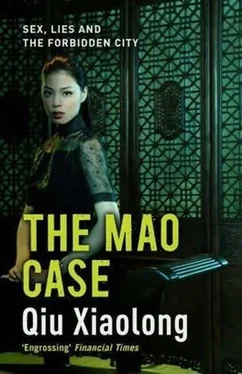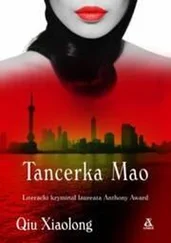“That’s something, Long,” Chen said. “I’m learning a lot today – apart from Mao’s poetry.”
“Few publishing houses are interested in poetry today,” Long said, looking him in the eye. “Are you trying to write something about his poems?”
“No, I’m no scholar, not like you. I majored in English, so I’m interested in translation.”
“Translation?”
“Yes, there was an official translation of Mao poetry in the seventies – by celebrated scholars and translators. One of them was a professor at Beijing Foreign Language University, where I studied. But the ‘politically correct’ interpretation could have been taken too far during those years. For instance, some of his poems could be personal, not just about revolution, but translators at the time had to translate them into revolutionary poems.”
“That’s true. Everything could be political in those days.”
“Poetry translation doesn’t simply mean word-to-word rendition. They should read like poems in the target language.” Chen opened his briefcase and took out his translation of classical Chinese love poems. “That’s a collection translated by Professor Yang and me. An American edition of it has just come out. We didn’t make much money, but we got a lot of publicity.”
“In today’s market, perhaps you could have a poetry collection of your own published here, and abroad too. You went to a conference in the United States not long ago, I remember. You know a lot of people there.”
“Some,” Chen said, thinking Long must have heard stories about him as the head of the delegation attending the literature conference – if not about his police work there. “That is why I’m coming to you today. A publishing house is interested in a translation of Mao’s poetry.”
“I’m not surprised. People know what a poet-translator you are,” Long said, crushing a crab claw with a small hammer – not a special crab hammer, but more likely a fine carpentry hammer, which served the purpose just as well. “I appreciate your thinking of me for the project. My annotated edition was published years ago, but I’ve recently finished an index of the new publications on his poetry. You surely can have both of them.”
“I have a copy of your annotated edition at home, but your new index may be very important. Since most of the books on the subject were published during the Cultural Revolution, the sourcing of their information was limited. You alone have continued your research, so you would have a lot of the latest information.”
“I’ve been working on a manuscript about his work, but it is not finished yet. As for new information, there may not be such a lot, I’m afraid.”
“I can’t wait to read it,” Chen said. In a manuscript meant for publication in China, however, the “new” material would be understandably limited. Nor would it provide what he was looking for. “Now with translation, the first step is interpretation. The poem Mao wrote for Madam Mao’s picture, for instance, could be a personal one.”
“ ‘Inscription on a Picture of the Celestial Cave in the Lu Mountains Taken by Comrade Li Jin.’ ” Long began reciting the poem from memory, holding a crab claw like a stick of chalk. “Against the gathering dusk stands a pine, sturdy, erect / in composure with riotous clouds sweeping past. / What a fairy cave it is, born out of the nature! / Ineffable beauty comes at the perilous peak.”
“In the sixties, the poem was read as a revolutionary stance against imperialism and revisionism – riotous clouds could be symbolic of the reactionary force, and also as an example of the closeness between Mao and Madam Mao,” Chen said, taking up a crab leg and, like Long, holding it like a piece of chalk. “After the downfall of the Gang of Four, Madam Mao became dog shit, and the poem was said to be simply the expression of Mao’s revolutionary spirit – nothing to do with Madam Mao. However, there’s a recent interpretation by Wang Guangmei.” Long would not need to be told who Wang Guangmei was – everyone was familiar with the wife of Liu Shaoqi, the late chairman of the People’s Republic of China. “According to Wang, Mao invited her to swim. Afterward they had lunch together without waiting for Madam Mao, who was pissed off. To appease her, Mao wrote a poem for her picture.”
“Yes, I heard about that,” Long said, nodding over the dazzling white meat and the shining scarlet ovary of a female crab he had just broken open, “but I doubt it’s reliable. Mao wouldn’t have told others about the occasion. Nor would Madam Mao. It is quite possibly merely a guess by Wang, who may still bear a grudge against Mao. And it’s understandable. After all, her husband was persecuted to death during the Cultural Revolution.”
“True. But even so, and even though Madam Mao was a shallow bitch, Mao could also have written it as man to woman, in a moment of passion. There is need to insist on a political interpretation, right?”
“That’s right, but what can I do for you, Chief Inspector Chen?”
“Help me understand the background of these poems, so we’ll have a reliable interpretation. I’ll acknowledge your help as a consultant for the project. And I’ll put it in my foreword that my translation is based on your studies.”
“You don’t have to do that -”
“Furthermore, I’ll pay you ten percent of the royalty, both here and abroad.”
“That’s way too much, Chief Inspector Chen. You have to tell me more specifically what you need.”
“Let’s continue on with that poem for Madam Mao. I’ve heard of another interpretation – an erotic one. In classical Chinese literature, a ‘fairy cave’ can be a metaphor for – well, what you know. The journey to the perilous peak is even more loaded with sexual suggestions. The fact that it was a poem between husband and wife lends itself to such an interpretation, though Madam Mao later used it for her own political gain.”
“No, that’s not the way to interpret a poem.”
“But you can’t miss some images. The sturdy and erect pine. And that against the dusk too. As if all those weren’t enough, there is the image of flying clouds. You know what cloud and rain mean in classical Chinese literature. Finally there is the perilous peak at the end of poem. Mao wasn’t young at the time. It might not have been so easy for him to reach the peak, you know what I mean.”
“But that’s almost absurd!”
“For a romantic poet, after a night of cloud and rain, in the fantastic view of the Lu Mountains – is it so hard to believe?”
“The poem was written in 1961. Mao and Madam Mao had separate room arrangements long before that. They didn’t live together in the Central South Sea. Why, all of a sudden, should Mao have written such a poem for her?”
“Well, after an unexpected reunion or reconciliation up in the mountains. Mao knew better than to write about such a night in an explicit way -”
“It’s in our poetic tradition to write about a painting or a picture – as a compliment or a comment. People shouldn’t read too much into it. That’s really all I can say, I think.”
“That’s fine, Long. Let’s set this poem aside for the moment and take a look at another one. ‘On the Photograph of a Militia Woman.’ Not a difficult poem. Also in the poetic tradition of writing about a picture. During my school years, the poem was even made into a song.”
“Yes, I can still sing it.” Long rose, eager for a change in their discussion. “Valiant and handsome, she shoulders a five-foot rifle, / in the parade grounds first lit by the sunlight. / A Chinese girl with an extraordinary aspiration, / she loves her military attire, not the extravagant fashion.”
“You are singing it so well,” Chen said, waving a crab leg meditatively like a conductor’s wand.
Читать дальше












